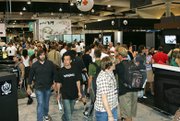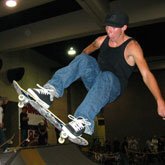ASR Bows Out, Action-Sports Brands Look for New Strategy
The Action Sports Retailer Trade Expo, the biannual trade show for the surf and skate business, on Nov. 3 confirmed reports that it has canceled all future events. The news, according to sources, wasn’t entirely a surprise. The 29-year-old show was the biggest action-sports expo on the West Coast, but in recent years it had struggled with timing, price resistance from exhibitors and retailer consolidation.
The show, which was alternately praised and chastised for being a marketing-heavy show seemingly more focused on networking than sales, routinely united 800 surf/skate, swim, moto and snow brands and nearly 6,000 retail buyers twice a year at the San Diego Convention Center.
But in recent years, exhibitors found that their return on investment at the show left much to be desired. “We’ve all been challenging the expense model,” said Toby Bost, chief executive of Irvine, Calif.–based La Jolla Group, which produces clothes for the O’Neill, hellip;Lost, Rusty, Metal Mulisha and True Love & False Idols brands—all of which participated regularly in ASR. “The ROI was questionable, at best.”
ASR, Bost said, had stopped being a venue to write orders. “ASR hasn’t been about putting pen to paper for five years.” Instead, it became a place for top-end brand executives to meet with retail executives to “plan and strategize for the next year”—something he said is invaluable but that couldn’t justify the expense of ASR.
Retailers, too, balked at some aspects of ASR.
Chris Broman, manager of Hermosa Beach, Calif.–based boutique Spyder Surfboards, said his store stopped shopping ASR in 2007. “It was super frustrating because of all of the crowds, the drunk people. It was more of a party than anything else,” Broman said. “We’d rather save our time and gas money and have the [surf label] reps come by the store. When you’re working and doing orders, you want to do it as quickly as possible,” he said.
However, Spyder will not stop shopping trade shows. “There’s Agenda,” Broman said, referring to the skate and streetwear show held biannually in Southern California, as well as in New York. “Everything is at Agenda. It’s the same concept as ASR but without the party scene.” Bost agreed but noted that Agenda wasn’t ASR’s only competition. The MAGIC Marketplace and MAGIC’s S.L.A.T.E., held biannually in Las Vegas, are also becoming viable options for action-sports brands. ASR is directing its exhibitors to its brother show, the Outdoor Retailer trade show, held twice a year in Salt Lake City.
Class@ASR, a licensed show that ran concurrently with ASR since 2009, will also shutter. However, the Class show will continue, and Jason Bates, the event’s founder, thinks Class could be an option for ASR and Class@ASR brands. “We may pick up a lot of brands that will be in that world. Class will open its doors to surf and skate companies that push boundaries with fashion. Hopefully, we can provide that platform for them.”
Even with so many options readily available to the surf/skate community, there is already talk that a new West Coast trade show or event may emerge to fill a void for the core market.
Doug Palladini, president of the Surf Industry Manufacturers Association, which partners with ASR and its East Coast competitor, Surf Expo, said the group had spent more than a year preparing for the eventuality of ASR’s closure. For 18 months SIMA has been interviewing members of the surf-industry retail and manufacturing community about their trade show needs. “It is sad to see a great trade show go, but we also believe that this is an excellent opportunity to rethink how we can get the most out of trade shows. We believe there is still value in having all of the surf brands, retailers and trade organizations under one roof,” he said.
That may mean SIMA could partner with the other surf/skate trade organizations to host an event. It could mean that the group may partner with Surf Expo for a West Coast edition. “Every option is on the table,” Palladini said. “Change is good.”Efforts to evolve
As the surf-and-skate market began to feel the effects of a down economy, ASR took steps to evolve and add value to its show floor. In 2009, the action-sports-show giant narrowed its focus back on the core market, striking a licensing deal with the contemporary Class trade show for Class@ASR, which showed swimwear and surf/skate crossover brands as well as emerging brands. Crossroads, a rough-and-tumble skate trade show from Northern California, joined ASR in San Diego in 2010, showing concurrently with ASR in the Petco Stadium parking lot. Sacred Craft, a consumer surfboard show, also joined ASR in 2010.
Another key shift was the introduction, in 2009, of cost-effective turn-key booth systems for both major and emerging brands. Eventually, the majority of brands would opt for the booth systems, dramatically changing the mood and look of the show floor. Still, that same year, Hurley announced it would no longer participate in ASR, and biggies such as Quiksilver, Roxy, Reef, Rip Curl, Matix and others began to opt out of some editions of ASR.
“It is unfortunate,” said Andy Tompkins, vice president of ASR’s producer, Nielsen Sport Group. “Despite having some excellent aspects, looking at the last four events, it was clear retail [attendance] was declining at each event,” and 2011’s shows were shaping up to be even smaller, he said. “At the [most recent] August show, we had every brand active in the action-sports industry represented, but we drew a smaller crowd than the year before.” General market factors were also a concern, including a struggling and consolidating retailer base. A tight credit market and struggling young brands in a market dominated by heritage brands also played a role in ASR’s demise, Tompkins said. “We pride ourselves in product that is effective and has a high level of return,” he said. When ASR stopped being able to deliver that, Nielsen made the decision to pull the plug.
For many in the industry, ASR was a defining event, and its passing marks the end of an era. “Personally, I am saddened for my friends who work for ASR and for the loss of such a storied cultural event, such as it were, for the action-sports industry,” said Gregory Weisman, an attorney with Los Angeles–based Silver & Freedman and chair of the law firm’s apparel-industry practice group. “Part Woodstock, part family reunion, it was emblematic of all that is the action-sports community, both good and bad, and will be missed.”
With additional reporting by Andrew Asch























